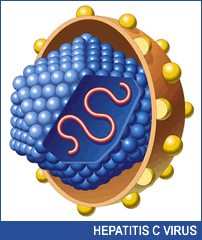Many
Genotype 1 Hepatitis C Patients Can Be Cured with 24 Weeks of
Telaprevir plus Pegylated Interferon/ribavirin
By
Liz Highleyman
 Xavier
Forns from the University of Barcelona and an international
team of colleagues conducted an open-label Phase 2 trial evaluating
telaprevir in combination with the standard regimen of pegylated
interferon plus ribavirin in people with hard-to-treat HCV genotype
1 who had not received prior interferon-based therapy.
Xavier
Forns from the University of Barcelona and an international
team of colleagues conducted an open-label Phase 2 trial evaluating
telaprevir in combination with the standard regimen of pegylated
interferon plus ribavirin in people with hard-to-treat HCV genotype
1 who had not received prior interferon-based therapy.
Study C208 included 161 participants in several European countries.
About half were men, 90% were white, the mean age was about
45 years, about 20% had advanced fibrosis or cirrhosis, and
approximately 80% had high baseline HCV RNA (> 800,000
IU/mL).
Participants were randomly allocated to 4 treatment arms, receiving
telaprevir at doses of either 750 mg 3 times daily (every 8
hours) or 1125 mg twice daily (every 12 hours), along with pegylated
interferon alfa-2a (Pegasys) or pegylated interferon alfa-2b
(PegIntron) plus weight-adjusted ribavirin. Patients took
telaprevir for 12 weeks and then continued pegylated interferon/ribavirin
for at least an additional 12 weeks.
In a response-guided design, patients who achieved rapid virological
response (RVR) at week 4 and maintained undetectable viral load
(< 25 IU/mL) through week 20 stopped treatment at 24 weeks,
while those who did not meet these criteria received pegylated
interferon/ribavirin for 48 weeks.
The main finding of Study C208 was that 80%-85% of patients
across treatment arms achieved sustained virological response
(SVR), or undetectable HCV viral load 24 weeks after completing
therapy. At EASL the investigators presented data from a sub-analysis
of efficacy according to dosing schedule and type of pegylated
interferon.
Results
 |
68%
of participants had undetectable HCV RNA from week 4 through
20 and were therefore eligible to stop therapy at 24 weeks. |
 |
18%
required treatment for 48 weeks. |
 |
14%
discontinued treatment before week 24 due to virological
failure, adverse events, or for other reasons. |
 |
Overall,
in an intent-to-treat analysis, sustained response rates
were high regardless of how often people took telaprevir
or which type of pegylated interferon they used: |
| |
 |
Every
8 hours with Pegasys: 85%; |
 |
Every
8 hours with PegIntron: 81%; |
 |
Every
12 hours with Pegasys: 83%; |
 |
Every
12 hours with PegIntron: 82%; |
|
 |
People
who achieved RVR and were treated for 24 weeks did better
than those without SVR who were treated for 48 weeks (96%
vs 79%, respectively). |
 |
Rates
of viral breakthrough during treatment and relapse after
treatment completion were low (14 and 9 participants, respectively). |
 |
Rates
of adverse event were similar across treatment arms. |
 |
The
most common adverse events were skin rash and pruritus (itching). |
 |
8%
of participants discontinued therapy due to adverse events,
most often rash. |
"The
majority of patients (68%) qualified to receive 24 weeks of
total treatment duration ([due to] undetectable HCV RNA from
week 4 through week 20)," the researchers concluded.
"Among these, a high proportion (93%-100%) achieved a SVR,
regardless of pegylated interferon type or telaprevir dosing
schedule," they added. "Continuing pegylated interferon/ribavirin
beyond 24 weeks resulted in high SVR rate in patients that did
not meet criteria for shorter treatment."
Liver Unit, University of Barcelona, Barcelona, Spain; Hôpital
Beaujon, Clichy, France; Department of Internal Medicine, Medical
University of Vienna, Vienna, Austria; Klinikum der Universität
zu Köln, Cologne, Germany; Department of Hepatology, University
Hospital Gasthuisberg, Leuven, Belgium; Clinic of Infectious
and Tropical Diseases, University of Brescia, Brescia, Italy;
Radboud University Nijmegen Medical Center, Nijmegen; Netherlands;
Hôpital St Antoine, Paris, France; Tibotec BVBA, Mechelen,
Belgium; Tibotec Inc, Yardley, PA.
5/14/10
Reference
X Forns, P Marcellin, P Ferenci, and others. On-treatment response-guided
therapy with telaprevir q8h or q12h combined with peginterferon
alfa-2a or peginterferon alfa-2b and ribavirin in treatment-naive
genotype 1 hepatitis C (Study C208). 45th Annual Meeting of
the European Association for the Study of the Liver (EASL 2010).
Vienna, Austria. April 14-18, 2010. (Abstract
56).